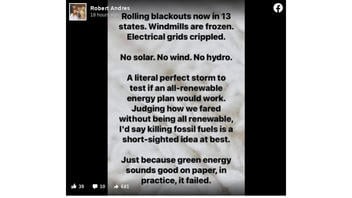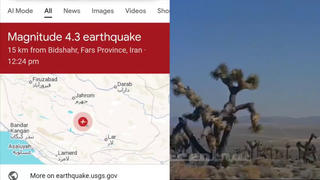
Are renewable energy sources the main reason for blackouts amid a deadly winter storm? No, that's not true: Renewables like wind and solar continue to produce, according to power grid officials, and are not the leading cause of the blackouts. Experts consulted by Lead Stories generally agreed that if any one source was most to blame it would be natural gas, but the failure is much larger than just one generation technology. It's system-wide.
The claim appeared in a Facebook post (archived here) published on February 16, 2021. The post read:
Rolling blackouts now in 13 states. Windmills are frozen. Electrical grids crippled. No solar. No wind. No hydro. A literal perfect storm to test if an all-renewable energy plan would work. Judging how we fared without being all renewable, I'd say killing fossil fuels is a short-sighted idea at best. Just because green energy sounds good on paper, in practice, it failed.
This is what the post looked like on Facebook at the time of writing:
(Source: Facebook screenshot taken on Wed Feb 17 21:40:27 2021 UTC)
The post, which did not cite any source, was referring to a deadly winter storm system that's gripped parts of the United States in mid-February 2021. In a bid "to preserve the reliability of the electric system as a whole," the Southwest Power Pool, on February 16, 2021, ordered rolling blackouts in 14 states, including Arkansas, Kansas and Oklahoma.
The post is correct on that point, but it is not correct in putting the blame for the blackouts primarily on renewable energy sources. To understand why, let's consider the case of Texas, which was hardest hit by the storm and where millions of people lost power.
According to the a statement from the Electric Reliability Council of Texas (ERCOT), dated February 18, 2021, roughly 40,000 megawatts of generation remained on "forced outage," and 23,500 megawatts of that was thermal generation -- which means 58% of the outages were natural gas, coal and nuclear energy, while about 42% would be wind and solar. In other words, renewable energy sources are not the main reason for the blackouts.
Main story continues to be the failure of thermal power plants -- natural gas, coal, and nuclear plants -- which ERCOT counts on to be there when needed. They've failed. Of about 70,000 MW of thermal plants in ERCOT, ~25-30,000 MW have been out since Sunday night. Huge problem.
-- JesseJenkins (@JesseJenkins) February 16, 2021
That isn't to say that renewables haven't also been challenged as a result of the extreme weather. Erik Olson, a climate and energy analyst at the Breakthrough Institute, an environmental research center, acknowledged the outsized impact of gas, while noting that no single factor or energy source is the cause of the blackouts per se. In an email, dated February 17, 2021, he wrote to Lead Stories:
Natural gas electricity has failed the most in terms of electricity capacity, but coal, nuclear, and wind energy have all had issues as well. Because Texas's electricity grid is powered by a plurality of natural gas, it naturally follows that natural gas related failures have had the largest impact. That being said, it isn't the 'fault' of natural gas or any single factor.
Renewables are certainly not responsible for the blackout in Texas or anywhere else. Severe cold weather has challenged the entire Texas electricity system because (as you might imagine) Texas's grid reliability plans did not properly prepare for (it) -- hence the failures from multiple generation technologies.
The shortfall between wind + solar and what ERCOT expected for a peak event was 2 GW, compared to 1 GW nuclear, a few GW coal, and around 30 GW of natural gas that went down.
In sum, blackouts are real, but renewable energy sources are not the primary cause. Despite some very real challenges, they have continued to produce, exceeding expectations in some instances.Politicians aren't just misleading us in blaming renewables as the leading cause of the Texas blackouts. They're pretending this is just a power system problem, that ERCOT alone could fix. We're in an __energy systems __ crisis.
-- Daniel Cohan (@cohan_ds) February 17, 2021


















